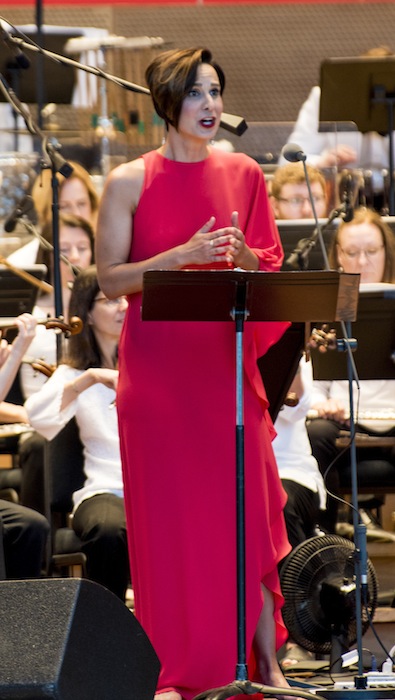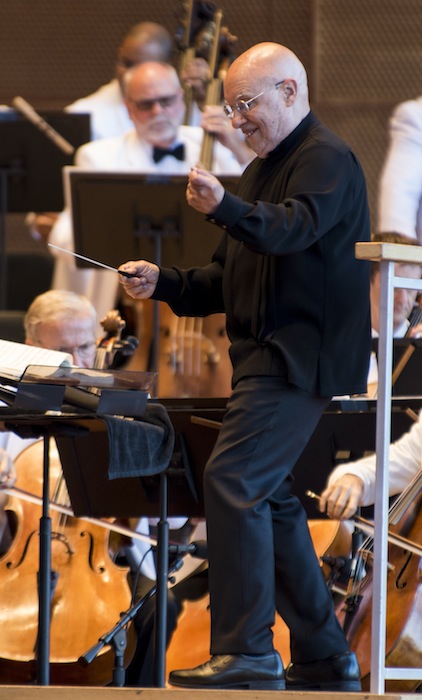Davies, Grant Park Orchestra offer Bolcom tribute, fresh Tchaikovsky

Amid the raging Lenny-mania from coast to coast, at least one music series this summer is recognizing that there are other American composers whose music is just as deserving of regular performances.
The Grant Park Music Festival already did its part for Leonard Bernstein’s centennial year with his Chichester Psalms. But the lakefront festival has also presented music of Walter Piston and Charles Tomlinson Griffes with works by Barber, Ives and John Vincent still to come.
Friday night at the Pritzker Pavilion the festival paid homage to a living American composer with whom it has enjoyed a fruitful relationship, William Bolcom. Four summers ago, the festival offered the world premiere of his Millennium: Concerto-Fantasia for Orchestra, a work commissioned by the festival.
While the Bolcom works on offer this weekend proved variable, the muscular, dedicated performances by conductor Dennis Russell Davies and the Grant Park Orchestra offered an apt tribute for the composer in his 80th birthday season (May 26, 1938). Bolcom and his wife, mezzo-soprano Joan Morris, were both in attendance.
Bolcom’s Symphony No. 4, “The Rose,” was heard in its festival premiere. Written in 1986, Bolcom’s Fourth is a big work, spanning 40 minutes and scored for large orchestra and vocal soloist.
The first movement (“Soundscape”) is restless and turbulent. Unsettled even in its contrasting lyrical passages, the music reflects the majestic yet stormy Northwest landscape and serves as a prelude of sorts.
The second and final movement is a setting for mezzo-soprano of Theodore Roethke’s four-part poem, The Rose. (Bolcom has been inspired by Roethke’s poetry from his earliest days, setting his words in his orchestral song cycle Open House.) At nearly a half-hour, the vocal setting of Roethke’s complete epic of nature painting is more than twice as long as the orchestral first movement.
Bill Bolcom has written several major works that deserve to be mainstays of the standard repertoire–not least his opera, A View from the Bridge, which is long overdue for a local revival.
There are some lovely moments in Bolcom’s symphony, as with the rising vocal line of the poem’s first part (“And I think of roses, roses”) or the calming solace of the final bars. And the orchestral writing is rendered with Bolcom’s usual scoring mastery, from the tempestuous first movement to the careful balancing of the orchestral forces under the soloist.
Yet ultimately “The Rose” isn’t among the composer’s most convincing works. Roethke’s nature imagery–largely inspired from his residency outside of Seattle–is indeed extraordinary. But Bolcom’s music is insufficiently varied and not indelible enough to sustain interest over its considerable length. The straitened range of the vocal part–originally written for Joan Morris–makes for a rather narrow expressive palette. And the somewhat didactic style of the vocal writing–especially the tedious spoken sprechstimme–too often feels like the soloist is delivering a lecture on Roethke’s poem rather than musically illuminating its essence.
There was certainly no lack of advocacy or commitment in Friday night’s local premiere. Performing barefoot, mezzo-soprano Kelley O’Connor was a charismatic presence, singing with crystal-clear diction, regal burnished tone and acute care for Roethke’s word-painting. A somewhat lower amplification level would likely have proven beneficial, allowing the soloist greater space for dynamic and expressive nuance.
Davies and the Grant Park Orchestra were fully simpatico partners, backing O’Connor with glove-like support, and serving up playing of power and atmosphere as needed.
In a bit of typically offbeat programming chronology, Tchaikovsky’s Symphony No. 5 was heard on the first half.
This Russian warhorse virtually defines summer festival repertoire. But Davies and the orchestra delivered an uncommonly fresh performance that was anything but routine.
“Revelatory” would be overstating it, but this taut, concentrated Fifth made this familiar score bloom anew. From the spacious take on the lugubrious introduction, Davies led with a sure sense of direction and focus, each movement building to its climax in a flowing and natural way. The outer movements went with strong dramatic grip and momentum. Davies even managed to put some quirky topspin on the Waltz, with a playfully subversive take.
Apart from a shaky horn solo in the Andante cantabile–not the first such instance this summer–the Grant Park Orchestra played with polish and full commitment, clearly responsive to their guest conductor. There was some unduly reticent brass playing and a fleeting loss of focus at tempo shifts in the finale, but Davies led the surging performance inexorably to the final bars, triumphant but not over the top.
Following the quiet ending of Bolcom’s Fourth Symphony, Davies and the orchestra wrapped the program with “Machine.” Befitting its title, this final movement of Bolcom’s Symphony No. 5 is a hard-charging motoric showpiece and made a suitably brilliant, slam-bang finish to the evening.
The program will be repeated 7:30 p.m. Saturday at the Pritzker Pavilion. gpmf.org
Posted in Performances





